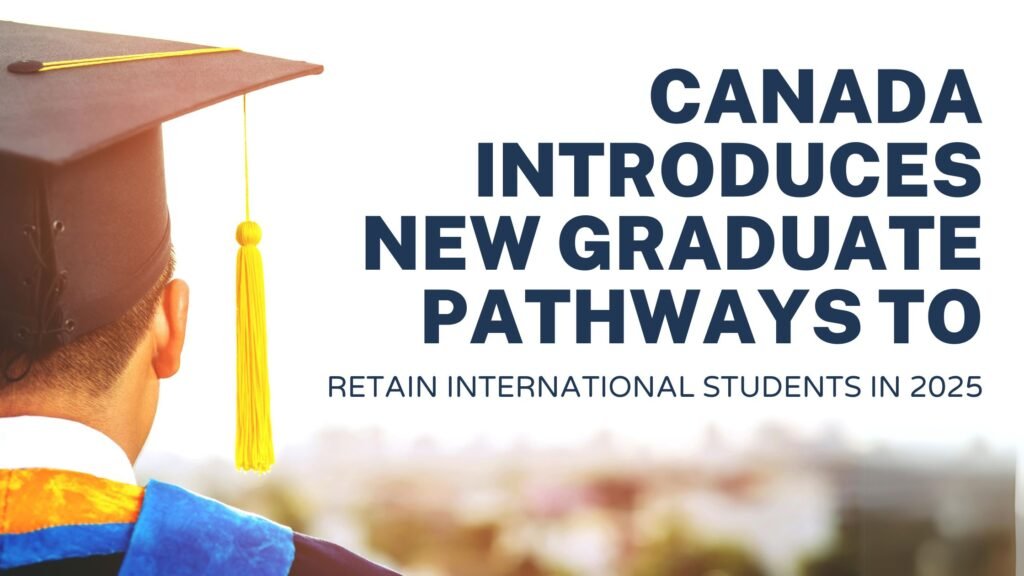As Canada remains a preferred study destination for international students new major shifts are expected in 2025 concerning those wishing to study or work in the country. For that reason, these updates must be thoroughly understood by international students, graduates, and educational consultants. This step-by-step approach will take you through these new graduate routes such as changes in visa requirements, post-graduate work permits, and PNPs among others.
Overview of Canada’s New Graduate Pathways 2025
Introduction to New Visa Rules
As part of the new visa measures that are set to be implemented in 2025, Canada is set to make various changes that are intended to help simplify the visa system while at the same time catering to the increasing number of students who are interested in studying in the country. These changes will affect many aspects including study permits and cost of living conditions hence the need for any aspiring student to be informed.
Temporary Cap on Study Permits
One of the major amendments put into practice here is the limited authorization of study permits. To this effect, in an attempt to deal with a high influx of international students, the Canadian government will every financial year limit the number of study permits it issues out. This cap should help equalize the development of education in the country to ensure that institutions can meet the demand for education without drain.
This change may bolster competition in study permits particularly in programs of high demand and institutions. International students should therefore be very keen when applying for a place in a college or university to be able to get a permit, depending on timing and program choice.
Revised Cost-of-Living Standards
Another critical update in 2025 is the revision of cost-of-living standards for international students. The new rules will require students to demonstrate higher financial stability, ensuring they can support themselves during their studies in Canada. This change reflects the rising cost of living across the country and aims to prevent financial difficulties that could disrupt students’ educational journeys.
Students planning to study in Canada should carefully review these new financial requirements and prepare accordingly. Financial planning will become even more critical, as demonstrating adequate funds will be a key factor in obtaining a study permit.
Post-Graduation Work Permit (PGWP) Changes
The Post-Graduation Work Permit (PGWP) program has long been a crucial pathway for international students to gain work experience in Canada after completing their studies. In 2025, the program will undergo significant changes, with new eligibility criteria and extended work permit durations for specific graduates.
Eligibility Criteria
The revised PGWP eligibility criteria will include stricter academic requirements and program-specific conditions. For instance, students will need to complete their studies in a recognized Canadian institution and meet specific academic performance standards to qualify for the PGWP. Additionally, graduates from certain programs, such as those related to STEM (Science, Technology, Engineering, and Mathematics) fields, may receive preferential treatment under the new rules.
International students should familiarize themselves with these updated eligibility criteria to ensure they meet the requirements and maximize their chances of securing a PGWP.
Extended PGWPs for Master’s Graduates
In a move to attract and retain highly skilled graduates, Canada will extend the duration of PGWPs for Master’s graduates. Starting in 2025, students who complete a Master’s degree in Canada will be eligible for a longer work permit, allowing them more time to gain valuable work experience and potentially qualify for permanent residency.
This change is particularly beneficial for those seeking to build a career in Canada, as it provides more time to establish themselves in the Canadian job market and meet the criteria for permanent residency programs.
Provincial Nominee Programs (PNPs) Updates
Provincial Nominee Programs (PNPs) offer an additional pathway for international students and graduates to secure permanent residency in Canada. In 2025, several provinces will introduce new streams and update existing ones to better align with local labor market needs.
BC PNP New Streams
British Columbia (BC) is leading the charge with the introduction of new PNP streams tailored specifically for international graduates. These streams will target graduates with degrees in high-demand fields such as technology, healthcare, and environmental sciences. By aligning with provincial labor market needs, these new streams aim to retain top talent within the province and support economic growth.
Other Provincial Changes
Other provinces, including Ontario, Alberta, and Quebec, are also expected to update their PNPs in 2025. These changes will vary by region, reflecting the unique economic and demographic needs of each province. International students should explore the specific PNP options available in their chosen province to identify the best pathways to permanent residency.
Impact on International Students
Increased Competition
With the introduction of new visa rules and changes to the PGWP program, competition among international students is expected to increase. The temporary cap on study permits will likely make it more challenging to secure a spot in Canadian institutions, particularly in high-demand programs. Additionally, the stricter eligibility criteria for PGWPs may result in more intense competition for post-graduation work opportunities.
International students should be prepared to differentiate themselves in their applications, both for study permits and work permits, by showcasing their academic achievements, extracurricular activities, and alignment with Canada’s labor market needs.
Regional Variations
The changes in Canada’s graduate pathways will not be uniform across the country. Regional variations will play a significant role, with different provinces offering unique opportunities and challenges. For example, while BC may introduce new PNP streams, other provinces might focus on enhancing existing programs or targeting specific industries.
Students should carefully consider these regional differences when planning their education and career paths in Canada. Choosing the right province based on individual goals and program offerings will be crucial to maximizing the benefits of Canada’s new graduate pathways.
Preparing for the Changes
Financial Planning
Given the revised cost-of-living standards and increased financial requirements, financial planning will be more critical than ever for international students. It’s essential to budget for tuition fees, living expenses, and any additional costs associated with studying in Canada.
Students should explore scholarship opportunities, financial aid programs, and part-time work options to ease the financial burden. Additionally, working with financial advisors or educational consultants can provide valuable insights into managing expenses effectively.
Application Process
With the increased competition and new eligibility criteria, international students must approach the application process strategically. Early planning, thorough research, and timely submission of applications will be key to securing study permits, PGWPs, and PNP nominations.
Students should also stay informed about any changes to the application processes and requirements, as these may evolve leading up to 2025. Utilizing resources such as official government websites and educational advisors can help ensure that all necessary steps are completed accurately and on time.
Consulting Educational Advisors
Navigating Canada’s new graduate pathways can be complex, especially with the upcoming changes in 2025. Consulting with educational advisors who specialize in Canadian immigration and education policies can provide invaluable guidance. These experts can help students understand the new rules, identify the best programs and provinces, and optimize their application strategies.
Conclusion
Canada’s new graduate pathways for 2025 present both opportunities and challenges for international students. By staying informed and preparing strategically, students can navigate these changes successfully and make the most of their educational and career opportunities in Canada. Whether through understanding the new visa rules, planning for financial requirements, or consulting with experts, a proactive approach will be key to achieving success in this evolving landscape.
Frequently Asked Questions (FAQs)
What are the new cost-of-living requirements for international students in Canada?
The new cost-of-living requirements for international students in Canada, effective in 2025, will necessitate higher financial proof to ensure that students can adequately support themselves during their studies. This revision reflects the rising costs of living in Canada and is aimed at preventing financial difficulties that could disrupt students’ education. Students will need to provide evidence of sufficient funds to cover tuition fees, accommodation, food, transportation, and other personal expenses.
How does the temporary cap on study permits affect international students?
The temporary cap on study permits, introduced as part of the 2025 visa rule changes, limits the number of study permits issued annually to manage the growing demand for Canadian education. This cap is likely to increase competition for study permits, especially for popular programs and institutions. International students will need to be strategic in their application processes, considering factors like timing, program choice, and academic excellence to enhance their chances of securing a permit.
What changes have been made to the Post-Graduation Work Permit (PGWP) program?
In 2025, the PGWP program will see several changes, including stricter eligibility criteria and extended work permit durations for specific graduates. To qualify for a PGWP, students must complete their studies at a recognized Canadian institution and meet certain academic performance standards. Additionally, Master’s graduates will benefit from extended PGWPs, giving them more time to gain work experience in Canada and potentially qualify for permanent residency.
What are the new streams introduced by the BC PNP for international graduates?
British Columbia’s Provincial Nominee Program (BC PNP) will introduce new streams in 2025, specifically targeting international graduates with degrees in high-demand fields such as technology, healthcare, and environmental sciences. These streams are designed to align with provincial labor market needs and retain top talent within the province. The new streams offer a promising pathway for graduates seeking to build their careers in BC and secure permanent residency.





Leave a Reply